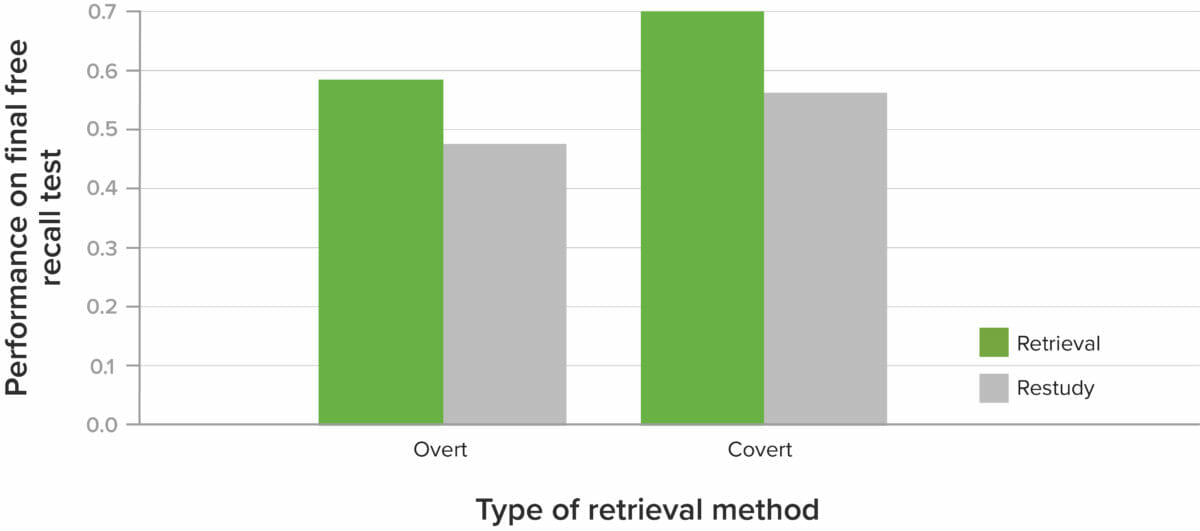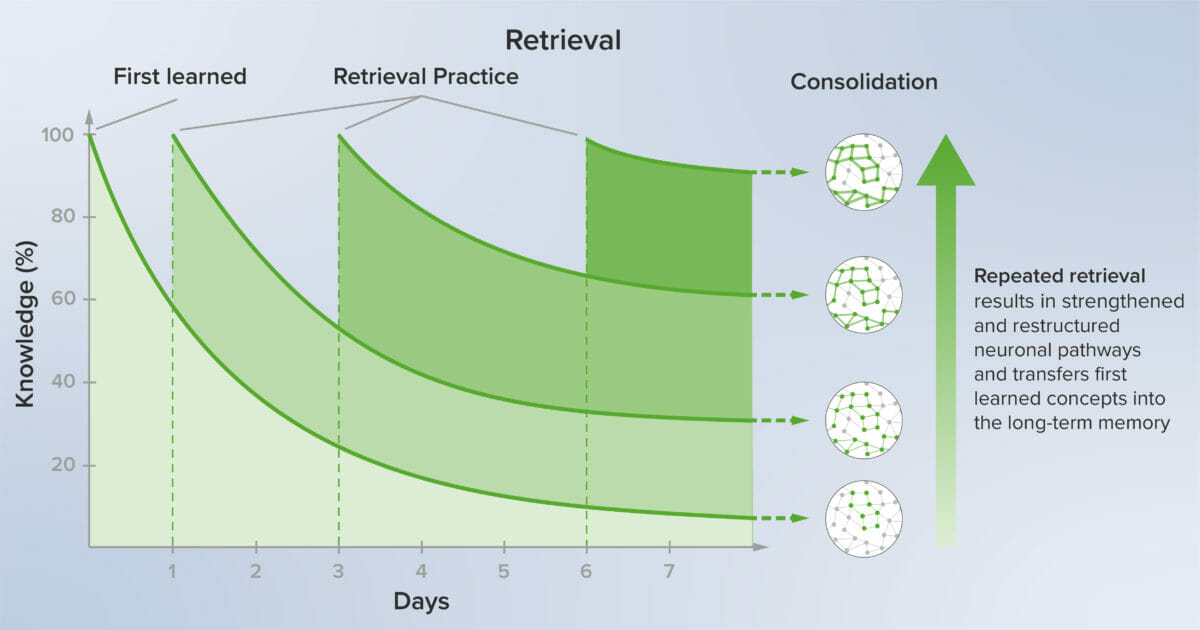Introduction
The ever-expanding body of medical knowledge means that every cohort of students has more to learn than the one before it, making efficient learning increasingly crucial as medical students seek out the most beneficial learning and study techniques. Research in the field of cognitive science has demonstrated that certain strategies can be highly effective, yet these strategies are often underutilized.
Retrieval of information from long-term memory upon demand(1-3) is a potent memory enhancement technique.(4)
Recent work has proven that retrieval is critical for “robust, durable, and long-term learning”,(5) both in studying and in the classroom. Moreover, retrieval helps to “create coherent and integrated mental representations of complex concepts, the kind of deep learning necessary to solve new problems and draw new inferences.”(5) All educators hope to instill deep learning and complex knowledge, but medical educators in particular seek to instill durable learning in the minds of future practitioners.
This article will focus on retrieval-based techniques, which include spaced retrieval, active recall, and the testing effect, as well as the evidence supporting the employment of retrieval strategies in learning. Research has shown that these tools support the goal of fostering durable learning in our future medical providers. Furthermore, these strategies can be implemented with relative ease and effectiveness using technological solutions.
The educational tools of spaced retrieval, active recall, and the testing effect are interrelated, and are sometimes referred to as active retrieval, spaced learning, distributed practice, spaced repetition, and the spacing effect. They are all examples of methods that produce desirable difficulties: mental efforts that are rewarded by enhanced memory.(6)
Just as athletes come to expect short-term challenges in order to reap the benefits of strength and endurance, the brain may function at its best when it is also taxed appropriately. The reward for this effort is knowledge retention—a fundamental skill for an excellent medical provider.(7) As Ebbinghaus depicted in his famous forgetting curve, memory fades in a predictable pattern. . Practicing retrieval can disrupt that forgetting pattern (see the image above). Retrieval is best implemented just as forgetting begins to occur, creating the desirable difficulty for the learner.(8)
What are Retrieval-Based Learning Strategies?
A short review of the educational methods of spaced learning and interleaving will help explain retrieval-based strategies.(9,10)
Spaced learning involves spreading out sessions of teaching or studying focused on a specific topic or concept over increasingly longer intervals of time with interspersed breaks (see the figure below).(11,12)
In using spaced learning, students should strive to increase the interstudy time for content with which they are more familiar and decrease the interstudy time for material that is still being learned, as illustrated in the figure below. (13)
In the strategy of interleaving, related concepts are mixed up in a particular learning or study session to maximize durable learning. Many retrieval strategies include elements of spaced practice and interleaving by distributing retrieval practice d over time or mixing related concepts.
The Types of Spaced Retrieval. Differentiated by the length of interstudy intervals, the two main types of spaced retrieval are equal-interval and expanding-interval spaced retrieval.(13)

The primary goal of retrieval-based learning strategies is to learn the material and retain it for the long term, rather than only to perform well on an assessment.(14) When retrieval requires effort, the learner benefits by both consolidating what has been learned and extending the retrievability of that knowledge.(14)
What is spaced repetition/spaced retrieval?
Spaced retrieval is a type of spaced or distributed learning, sharing qualities of both spaced learning and retrieval practice.(16) Spaced retrieval is the recalling of knowledge on a certain topic over varying periods of time. This interstudy interval must be just right: too short and the information recalled is still in working memory and not in long-term memory; too long and the retrieval might not be successful.With too-long intervals, frustration over the forgetting that has already occurred will be at odds with the motivation needed to continue effortful learning.
Although experts disagree about the most beneficial pattern for a spaced retrieval protocol,(17–19) most allow that spaced retrieval produces better long-term retention than other studying methods and remains “a key process for understanding learning and promoting learning.”(5)
What is the active recall study method?
Active recall is a type of active studying, requiring the retrieval of requested information in an arduous way (as opposed to the learner rereading a passage in a textbook, for example). Active studying techniques involve desirable difficulty, or working with the material in an effortful way that facilitates retention.
In active recall techniques, a learner can be asked to remember information by either free recall, an open-ended question with no parameters, or guided or cued recall, for which the learner is given some kind of structured prompt to guide the course of the answer.(12)
What is the testing effect?
The testing effect refers to the outcome of enhanced memory as a result of taking a test and shares some characteristics of both spaced retrieval and active recall.(20) Although testing is considered to be primarily an assessment tool, studies have long shown that the action of taking low-stakes practice tests leads to an increase in retention compared with spending an equal amount of time studying.(21) In this sense, testing in itself is a type of retrieval.
Evidence for Retrieval-Based Learning Strategies
Retrieval needs to be effortful to be impactful, but the retrieval task must be in line with the level of understanding that is attainable for the learner.
The level of desirable difficulty varies according to the level of knowledge of the learner: When a learner lacks sufficient knowledge and background skill to solve the presented problem, the difficulty becomes undesirable and no longer promotes learning.(22) This understanding is foundational for retrieval strategies to be effective.
Some impressive results from research on the effectiveness of the repeated use of spaced retrieval compared with single recall or repeated mass retrieval (repeated retrieval with no spacing) can be seen in the figure below.(23) This research illustrates the powerful effects that repeated spaced retrieval has on retention, especially when compared with other methods, while a related study showed retrieval’s superiority over studying with a concept map.(24)
Performance on Final Recall, Comparing Different Study Strategies. Repeated spaced retrieval is superior to other study strategies for improving final recall.(23)

Further evidence for retrieval can be seen in a study that compared simply bringing to mind information (covert retrieval) to overtly retrieving information (such as answering a question through speech or writing).
The study found that both retrieval methods outperformed restudying the material on a final assessment, but that covert retrieval produced a higher performance on free recall tests (see figure below).(25) This study suggests that learners should implement retrieval activities in learning regardless of the specific type of retrieval strategy.
Performance on Final Recall, Comparing Overt and Covert Retrieval Methods. Both overt and covert retrieval improve final recall over restudying techniques.(25)

Other research on effective learning techniques has looked at spaced learning and retrieval practices. Research focusing on the effectiveness of ten learning techniques found that spaced learning and practice testing were two of the most highly effective learning strategies across different learner ages and abilities, boosting student performance across many criterion tasks, and that practice testing offered particular ease of use.(26)
A recent meta-analysis showed that just taking a practice test before a final test on the same material produced substantial gains in both learning and retention compared with all other learning conditions considered in the research.(27)
Several studies have focused on the effects of retrieval in premedical and medical students. In a study involving anatomy and physiology students, two experimental groups were given practice quizzes on previously learned material, one employing expanding-interval retrieval and the other equal-interval retrieval. The study found that, although there was no significant difference between the two spaced practice categories, both experimental groups had a 41% better retention of information compared with the control group, which did not engage in retrieval practice.(28)
In line with the outcomes of this research, a study involving medical students taking a course on in-hospital resuscitation found that the experimental group, who received 3.5 hours of instruction followed by 0.5 hours of testing, had a mean score of 82.8% on assessment compared with the control group, who received only instruction and training but no testing and scored an average of 73.3%.(29)
Other studies involving medical students found that they showed improved retention of clinical knowledge and better performance on standardized tests when they employed self-guided spaced practice or spaced retrieval problem sets.(30,31)
Why Students Learn Better with Retrieval Practice Techniques
Insights from cognitive science
Cognitive scientists have gained insights into why retrieval works. In their book Make It Stick, Brown et al. summarize the research on retrieval-based strategies and conclude: “When retrieval practice is spaced, allowing some forgetting to occur between tests, it leads to stronger long-term retention than when it is massed.”(8)
Why is retrieval, and specifically spaced retrieval, so powerful? The authors explain that passive study tactics (like rereading) create illusions of knowing that can be misleading to the learner regarding his or her true knowledge competency. In contrast, retrieval strategies reduce forgetting, because practice fosters a strengthening of that information in long-term memory (5,14), helping the learner retrieve it more easily the next time.(8)
This retrieval-mediated learning benefit is thought to be due to the “co-activation of related (semantic) information during retrieval,” strengthening the associated neural network. It also appears that retrieval “supports the creation of a generalized memory trace.”(4)
An additional positive benefit for both educators and students results from taking quizzes or tests in the form of metacognitive feedback on how well learning is advancing.(32)
Spaced retrieval “produces knowledge that can be retrieved flexibly and transferred to other situations.” When students use self-testing with corrected feedback, they can thus assess their own knowledge gaps and become more self-sufficient learners.(32)
A review of learning efficiency in medical education concluded that retrieval practice using short-answer tests had an advantage over multiple-choice tests, but that feedback was required for it to be beneficial.(33)
Another study concluded that learning basic factual knowledge in medical education was often undervalued and could be enhanced by retrieval strategies.(34)
Insights from neuroscience
Retrieval involves accessing information in long-term memory, but much is still unknown about the neuroscientific basis of retrieval’s impact on strengthening memory. Scientists categorize the phases of memory processing into encoding, storage, and retrieval. How well information is retrieved depends upon encoding at the time of learning and cues at the time of retrieval.(33)
It has been suggested that the process of retrieval reawakens stored memory traces, and recent animal studies have shown that the relationship between the neural pathway and retrieval cues for knowledge accessibility is important for retrieval success.(35)
Significant evidence supports the theory of consolidation, a process by which newly learned material or experiences are transformed into long-term memory.(1) Consolidation involves both the hippocampus and the neocortex of the brain and occurs through the process of strengthening the neural connections.(1) These neural pathways are thought to be restructured by the repeated retrieval of the same information, which may result in changes in the synapses between neurons, in neuronal protein synthesis, and perhaps in the membrane potential of neurons.(36)
It has also been hypothesized that the act of retrieval accelerates consolidation by supporting adaptive neural connections between the hippocampus and the neocortex.(37)
The hippocampus, which has been described as an index for information storage in long-term memory, is thought to be involved in the retrieval process.(38) Other research has proposed a link between the consolidation process and the effects of retrieval-mediated learning.(39)
How to Use Retrieval Practice in Medical Education: Examples for Practical Application
Would you like to learn more? Explore the Pulse Seminar Library.
Implementation in the classroom
One of the most significant challenges for medical educators is conveying to students the inadequacies of passive studying techniques, which remain quite popular among students despite evidence to the contrary. Examples of passive studying are reading over notes, rereading textbooks, highlighting large chunks of information, and ineffective use of flashcards in self-quizzing. Many students believe that study techniques that make them feel good in the short term are preferable to active study strategies like retrieval, which they experience as difficult and frustrating.(17,40)
Why do students continue to choose ineffective and inefficient study tactics? Frustrated educators are met with student resistance to retrieval-based strategies that have been proven to be more effective and time-saving. Research suggests that students generally determine their own learning strategies and choose methods that are quick and easy, giving them an illusion of knowing.(17) Students then do not further review the topics they have covered, resulting in suboptimal long-term knowledge retention.(12)
A study that asked students to rank their study strategies found that the vast majority of students surveyed chose ineffective study methods (see the figure below).(17) When educators instruct their students about the benefits of retrieval strategies, some evidence suggests that this knowledge leads to higher adoption of the superior study tools.(41)
Student Study Strategy Usage. Rereading was found to be the most frequently used strategy by students despite the fact that it is less beneficial than other, more effective study strategies.(17)

When focusing on classroom implementation, educators should take students’ sense of well-being into account. For learners, test anxiety can reduce the benefits of the testing effect.(42) In a study in which quizzes were given under differing conditions of high and low stress, both groups of students did equally well on the quizzes, but only the students who took the quizzes under low-stress conditions earned better scores on the subsequent criterion test.(42)
Other research supports this assertion, indicating that educators may want to utilize low-stakes assessments to boost the power of retrieval strategies.(43,44) Perhaps if both teachers and students were convinced of these findings, different choices would be made for more effective study strategies.
The practice of retrieval may also protect against student stress. Researchers acknowledge that although acute stress can impair memory, using practice tests could strengthen memory without the stress effects of taking a real test.(44)
So what are options for the implementation of retrieval in the classroom? Educators should identify the most important topics in their courses, teach them in their entirety, and then use short-answer questions with correct feedback in order to solidify knowledge.(21)
Assigning ungraded quizzes or practice tests is a way to achieve the goal of minimizing the negative effects of test anxiety while promoting the benefits of the testing effect. Practicing retrieval can be as simple as asking students to put away materials after a lesson and then attempting to summarize the information presented that day or on previous days. These strategies have been referred to as “jots”, as in “to jot down” recalled answers to a guiding question, jot sketches of anatomical relationships, or jot summaries of previously learned content.(1)
Educators can also suggest the use of the Leitner system of flashcards, which employs the use of spaced retrieval: Students categorize information that they are more familiar with and retrieve those concepts at increasing intervals using the flashcards.(45)
Instructors can give students practice quizzes or open-ended questions, or even assign a concept map as a quiz on interrelated topics (which is a good way to introduce interleaving).(46) A think–pair–share strategy, in which the instructor poses a probing question to the class and students work first in partners and then report the information, is an excellent way to practice retrieval while also engaging in collaborative learning.(47)
Implementation in e-learning
Many experts advocate the utilization of technology to enhance retrieval-based learning strategies. For example, learning expert Daisy Christodoulou strongly recommends personalized digital learning platforms as the next best thing to cloning an instructor to meet each individual student’s educational needs.(48) Algorithms can take the guesswork out of what questions to ask of learners and when to ask them. They also provide unbiased feedback on answers to questions, saving teachers time and circumventing the problem of the illusion of knowing when students self-assess their knowledge.(17)
Some digital education platforms can keep track of questions correctly answered by students and rotate them through a spaced learning schedule. These digital learning platforms can be individualized by the learner to incorporate other techniques, such as interleaving, elaboration, concrete examples, and dual coding, all of which can enhance durable learning.
E-learning platforms use various functionalities to implement spaced retrieval. Some employ tools that use a retrieval algorithm that returns questions to the learner based on specific characteristics, such as student confidence and correctness of responses.
For example, the Lecturio platform includes a spaced retrieval algorithm that encourages frequent recall practice. For students using Lecturio, answering more of these recall questions has been linked to higher test scores.
The diagram below depicts a proposed visualization of the integration of retrieval-based strategies from the teacher’s and student’s perspectives. Students need to have clear learning objectives and criteria for evaluating their performance.(50) Educators should steer students toward evidence-based learning strategies (e.g., dual coding, elaboration, and concrete examples) and give timely feedback and guidance, even when a digital learning platform is used.(51)
Students need to be assisted with appropriate goal setting, proper study materials, and retrieval opportunities, such a practice quizzes or low-stakes assessments targeted to the appropriate level of student knowledge.(52)
Schematic for the implementation of retrieval strategies (from Lecturio)

Recommendations
Tips for educators
- Implement retrieval-based strategies such as spaced retrieval and active recall.
- Utilize frequent low-stakes tests. These can be formative or summative depending on the makeup of your student body and educational goals.
- Educate students about the evidence that retrieval strategies, especially spaced retrieval, are superior and that it is metacognitive biases that keep students relying on inefficient study strategies.
- Help students understand that retrieval practice is significantly more effective when it is spaced out rather than massed.
- Make use of digital learning platforms and sophisticated algorithms to deliver effective retrieval methods of study that can customize learning tools for students.
Tips for students to improve their learning process
- If the course instructor does not offer digital learning platforms as a resource for the course, students can consider independent use of these resources to more easily implement spaced retrieval study methods.
- Students lacking access to a digital platform can use flashcards according to the Leitner system, in which concepts that are known are sequenced through the deck less frequently than ones that are still being learned.
- Students should recognize that effortful study strategies like retrieval are underutilized, and that more popular studying tactics like rereading and highlighting are passive and therefore limited in facilitating long-term knowledge acquisition.
- Students should understand that when using retrieval strategies and self-checking their knowledge on retrieval tasks, they may not have an impartial judgment on correctness. This bias could result in an illusion of knowing, negatively affecting their long-term performance.
Conclusion
Retrieval-based strategies such as spaced retrieval, active recall, and the testing effect are exceptionally effective learning tools. Their use does more than just better prepare students for assessments; it actually improves long-term retention of knowledge, which is critical for medical learners. Retrieval, specifically spaced retrieval, limits the effects of forgetting and facilitates the recall of information. Its relative ease of implementation in the classroom and the advantages of e-learning technologies that incorporate retrieval make retrieval-based strategies an essential element in medical teaching.
Self-Quiz
(Please select all that apply)
1. Which of the following learning strategies has been shown to enhance knowledge retention?
a. Spaced retrieval
b. Active recall
c. The testing effect
d. All of the above
2. Which of the following statements are true concerning spaced retrieval?
a. It incorporates some of the spaced practice concepts.
b. Its implementation within an e-learning environment is enhanced by algorithms.
c. It is the only retrieval method that enhances memory.
d. There is significant research to support its use in classrooms.
3. The metacognitive practice of bringing to mind content can improve knowledge acquisition.
a. True
b. False
4. Research shows that students tend to choose study methods that are evidence-based and efficient for improving long-term retention.
a. True
b. False
5. Which of the following statements is supported by the cognitive science and neuroscientific evidence concerning retrieval-based strategies?
a. The process of retrieval is thought to enhance stored memory traces.
b. The illusion of knowing is not a factor involved in any type of retrieval practice.
c. The process of feedback should be delayed for some time after students practice retrieval, as it is part of desirable difficulties for students.
d. The process of retrieval is thought to accelerate the consolidation process.
Correct answers: (1) d. (2) a, b, d. (3) a. (4) b. (5) a, d.



